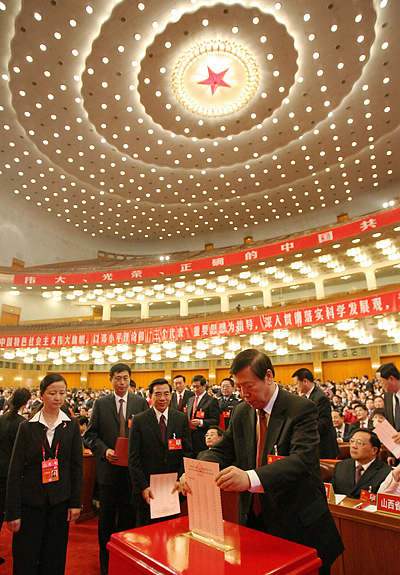|
 |
|
GRAND MEETING: Participants elect the Central Committee at the 17th National Congress of the Communist Party of Chinain Beijing in October 2007 (MA ZHANCHENG) |
The Communist Party of China (CPC) holds the core leadership position in socialist China. The CPC Central Committee makes decisions on policies concerning all major issues about China's economic and social development.
The Constitution of the CPC says, "The Party is an integral body organized under its program and Constitution and on the basis of democratic centralism." All major issues shall be decided upon by the Party committees after discussion in accordance with the principle of collective leadership, democratic centralism and individual consultations and decision by meetings.
The National Congress of the Party is held once every five years and convened by the Central Committee.
The Central Committee of the Party is elected for a term of five years. It meets in plenary session at least once a year, and such sessions are convened by the Political Bureau of the CPC Central Committee.
When the National Congress is adjourned, the Central Committee carries out its resolution, directs the entire work of the Party and represents the CPC in its external relations.
The Political Bureau, the Standing Committee of the Political Bureau, and the general secretary of the Central Committee of the Party are elected by the Central Committee in plenary session. The general secretary of the Central Committee must be a member of the Standing Committee of the Political Bureau.
When the Central Committee is adjourned, the Political Bureau and its Standing Committee exercise the functions and powers of the Central Committee.
Deng Xiaoping, the chief architect of China's reform and opening up policy, said, "The crucial thing for China is for the Communist Party to have a good Political Bureau, particularly a good Standing Committee of the Political Bureau." The Political Bureau of the CPC Central Committee and its Standing Committee are the top decision-making bodies in China.
In December 1978, the Third Plenary Session of the 11th CPC Central Committee was convened, which ushered in China's reform and opening up. In the following 32 years, the Political Bureau of the CPC Central Committee and its Standing Committee have played a very important leadership role.
On September 1-11, 1982, the 12th CPC National Congress was held in Beijing. Deng delivered the opening speech, and put forward, for the first time, the mission of "building socialism with Chinese characteristics." Deng said, "We must integrate the universal truth of Marxism with the concrete realities of China, blaze a path of our own and build a socialism with Chinese characteristics—that is the basic conclusion we have reached after reviewing our long history."
On October 12-18, 1992, the 14th CPC National Congress was convened. In his report, Jiang Zemin, then General Secretary of the CPC Central Committee, articulated the goal of China's economic reform which is to establish a socialist market economy.
On September 12-18, 1997, the 15th CPC National Congress was convened. Jiang delivered a report. The report stresses the importance of governing the country according to law and making it a socialist country ruled by law.
The Congress passed a resolution, which stipulates that the CPC takes Marxism-Leninism, Mao Zedong Thought and Deng Xiaoping Theory as its guide to action.
In November 2002 and October 2007, the 16th and 17th CPC national congresses were respectively held. The CPC Central Committee led by General Secretary Hu Jintao called on the Party to strengthen its governance ability and vanguard nature, apply the Scientific Outlook on Development and build a harmonious socialist society.
All the above-mentioned important policies were initiated and led by the Political Bureau of the CPC Central Committee and its Standing Committee.
Democratic centralism is the CPC's fundamental organizational principle and leadership system. It is a combination of centralism on the basis of democracy and democracy under centralized leadership and represents a high degree of centralization based on a high degree of democracy.
Policies made under democratic centralism can pool collective wisdom, are more likely to be right and less likely to be wrong, and besides, they can be implemented immediately.
Deng said democratic centralism is one of China's advantages. "This system works to foster unity among the people, making it much better than Western-style democracy. And once we make a decision, it can be immediately implemented," he said.
The CPC has more than 3.7 million grassroots organizations, with nearly 78 million members. Once the Political Bureau of the CPC Central Committee and its Standing Committee make a decision, it will be immediately passed down to local Party organizations at all levels and be carried out at every level. These are the prominent characteristics and advantage of the Party's decision-making system.
Nonetheless, before major policies are put into effect, the CPC customarily solicits opinions from democratic parties. This is part of the political consultative system that has been established over time.
The author is a researcher with the Marxism Institute, Chinese Academy of Social Sciences | 